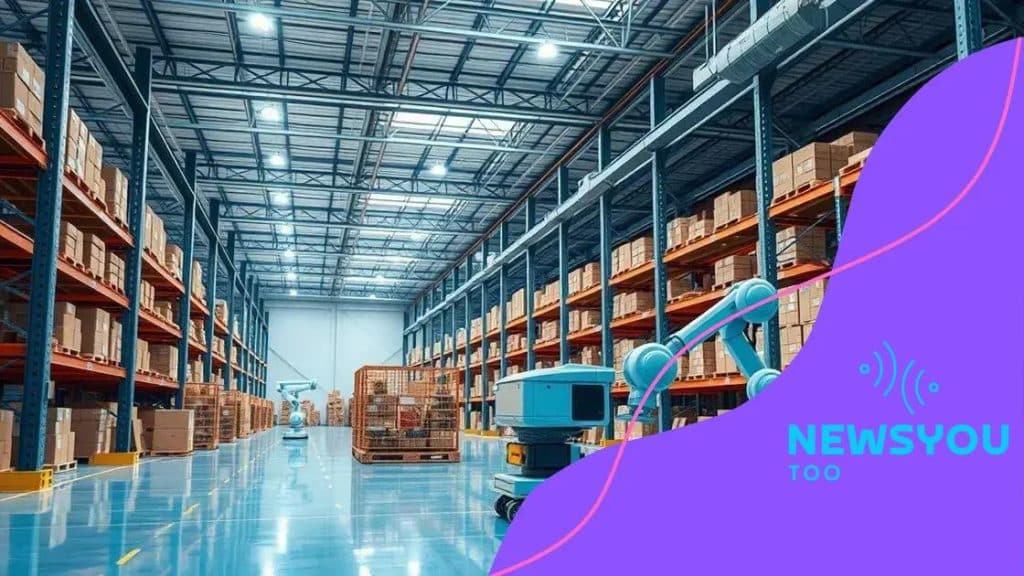How AI is improving supply chain efficiency

Anúncios
How AI is improving supply chain efficiency by enhancing demand forecasting, automating processes, and fostering stronger supplier collaborations, ultimately leading to reduced costs and increased operational effectiveness.
How AI is improving supply chain efficiency is a game changer for businesses today. Imagine being able to predict disruptions before they happen! This technology doesn’t just streamline processes; it reshapes how we think about logistics and operations.
Anúncios
Understanding AI’s role in supply chain management
Understanding how AI enhances supply chain management is essential for any business looking to optimize processes. Artificial intelligence is transforming the way companies operate, making it more efficient and responsive.
AI in Demand Forecasting
One of the primary applications of AI is in demand forecasting. By analyzing historical data and current trends, AI can predict future demand with remarkable accuracy. This helps businesses avoid overstock and stockouts.
- Analyzes consumer behavior and trends
- Uses machine learning for improved accuracy
- Balances inventory with market needs
With better forecasting, companies can streamline their inventory management and reduce costs.
Anúncios
Optimizing Logistics Operations
Another key role of AI is in logistics optimization. AI solutions can analyze routes and delivery schedules to find the most efficient ways to meet customer demands.
- Reduces transportation costs
- Improves delivery times
- Enhances overall operational efficiency
By understanding traffic patterns and weather conditions, AI tools can suggest alternative routes, ensuring faster and more reliable deliveries.
Moreover, AI helps companies manage their suppliers more effectively. By analyzing supplier performance data, AI can identify potential risks and opportunities, allowing businesses to make informed decisions quickly. This not only strengthens partnerships but also ensures a smoother supply chain overall.
Implementing AI does require investment in technology and training, but the long-term benefits are significant. Companies leveraging AI stand to gain a competitive edge in today’s fast-paced market.
Real-time data analytics for better decision-making
Real-time data analytics plays a crucial role in enhancing decision-making processes within supply chains. By leveraging real-time data, businesses can respond quickly to changing conditions, improving overall efficiency.
Benefits of Real-time Data Analytics
Utilizing real-time data allows companies to monitor their operations continuously. This ongoing analysis leads to several benefits, including:
- Immediate identification of trends and issues
- Enhanced forecasting accuracy
- Improved product availability
With the ability to analyze data as it happens, organizations can pivot strategies on the fly, ensuring they stay ahead of their competitors.
Application in Supply Chain Management
In supply chain management, real-time analytics can transform how companies handle logistics. By monitoring data points like traffic conditions and shipment statuses, businesses can optimize their routing and scheduling. This efficiency translates to lower costs and faster deliveries.
Moreover, tracking customer preferences in real-time allows companies to adjust their offerings more effectively. This flexibility meets consumer demands without unnecessary delays.
Integrating AI with data analytics further enhances this process. AI can process vast amounts of information quickly, providing actionable insights that human analysts may miss. By combining these technologies, organizations create a powerful decision-making toolkit.
Ultimately, harnessing real-time data analytics leads to a more responsive and agile supply chain, which is essential in today’s fast-paced market.
Automation in inventory management

Automation in inventory management is revolutionizing how businesses handle their stock. By incorporating automated systems, companies can streamline processes and reduce human errors.
Benefits of Automation
Implementing automation brings numerous advantages:
- Increased accuracy in inventory tracking
- Reduced labor costs through fewer manual tasks
- Enhanced visibility of stock levels
With these benefits, companies can ensure that they always have the right amount of product on hand to meet customer demand.
How It Works
Inventory automation typically involves the use of software systems that manage stock levels, orders, and deliveries. These systems integrate with existing processes to provide real-time data on inventory status.
Automated solutions like barcode scanning and RFID technology help companies manage their inventory efficiently. Instead of manually entering data, these tools automatically update stock levels, making it easier to track what is in the warehouse and what needs to be ordered.
Moreover, automated inventory systems can generate alerts when stock levels reach a certain threshold. This ensures that businesses never run out of critical items and can fulfill customer orders swiftly.
Additionally, data analytics play a key role in automation. By analyzing patterns and trends, companies can optimize their inventory based on demand forecasts. This leads to better purchasing decisions and reduces excess stock.
The transition to automated inventory management does require an initial investment in technology and training, but the long-term savings and efficiency gains are well worth it.
Enhancing supplier collaboration with AI
Enhancing supplier collaboration with AI is vital for building strong partnerships and improving supply chain efficiency. With artificial intelligence, businesses can streamline communications and data sharing.
Benefits of AI in Supplier Collaboration
Utilizing AI fosters better collaboration by providing real-time insights and data-driven recommendations. The key benefits include:
- Faster response times to inquiries and issues
- Improved accuracy in order fulfillment
- Stronger alignment on goals and objectives
This leads to smoother operations and a more cohesive supply chain.
AI Tools for Collaboration
Various AI tools can enhance supplier collaboration. Platforms that integrate machine learning facilitate seamless communication and data exchange between businesses and suppliers.
For instance, AI-driven systems can analyze historical data to predict potential supply chain disruptions. By identifying risks early, companies can work closely with their suppliers to develop contingency plans. This proactive approach enhances overall resilience.
Moreover, AI tools help monitor supplier performance by tracking key performance indicators (KPIs) and providing actionable insights. This creates transparency and accountability, leading to better decision-making.
As companies rely on technology to strengthen their supplier relationships, it is crucial to ensure proper training for employees. By equipping teams with technological knowledge, organizations can maximize the benefits of AI.
Ultimately, enhancing supplier collaboration with AI not only improves operational efficiency but also fosters long-term partnerships that benefit everyone involved in the supply chain.
Future trends of AI in supply chains
Future trends of AI in supply chains are shaping the way businesses operate and interact with customers. As technology continues to advance, companies are finding innovative ways to leverage artificial intelligence to gain a competitive edge.
Predictive Analytics
One major trend is the increased use of predictive analytics. This involves analyzing data to make forecasts about future demand and trends. Businesses can better understand consumer behavior and adjust their inventory accordingly.
- Identifies seasonal trends
- Minimizes stockouts and excess inventory
- Enhances customer satisfaction
By anticipating needs, companies can respond faster and more effectively.
Enhanced Automation
Another trend is enhanced automation through AI technologies. More organizations are adopting automated systems for tasks like inventory management, order processing, and logistics planning. These systems help reduce labor costs and increase accuracy.
AI-driven robots and drones are also being utilized for warehouse operations and last-mile delivery, making processes faster and more efficient. This type of automation not only cuts operational costs but also improves service delivery to customers.
Additionally, the integration of AI with IoT (Internet of Things) is on the rise. Smart devices will continuously gather data, enabling real-time tracking and monitoring of goods throughout the supply chain. This data can enhance decision-making and improve overall efficiency.
Blockchain Integration
Looking ahead, the combination of AI and blockchain technology offers exciting possibilities. Blockchain can provide a secure and transparent way to manage supply chain transactions, while AI can analyze blockchain data for insights.
This integration can lead to improved traceability, ensuring that products are sourced ethically and efficiently.
As these trends evolve, businesses that embrace AI will be better positioned to adapt to the rapidly changing market landscape. Continuous investment in technology will be crucial for staying ahead of the competition.
In conclusion, AI is revolutionizing supply chain management in many exciting ways. By utilizing technologies like real-time data analytics and automation, businesses can enhance efficiency and collaboration. Looking ahead, trends such as predictive analytics, enhanced automation, and the integration of AI with blockchain will shape the future of how supply chains operate. Embracing these advancements will help companies stay competitive and better meet customer demands.
FAQ – Frequently Asked Questions about AI in Supply Chains
How can AI improve supply chain efficiency?
AI enhances efficiency by automating processes, providing real-time analytics, and improving demand forecasting.
What role does predictive analytics play in supply chains?
Predictive analytics forecasts demand and inventory needs, enabling businesses to plan better and reduce stockouts.
What are the benefits of automation in inventory management?
Automation increases accuracy, reduces costs, and speeds up inventory tracking and order fulfillment.
How does AI enhance supplier collaboration?
AI facilitates better communication and data sharing, allowing companies to align goals and improve supplier performance.





